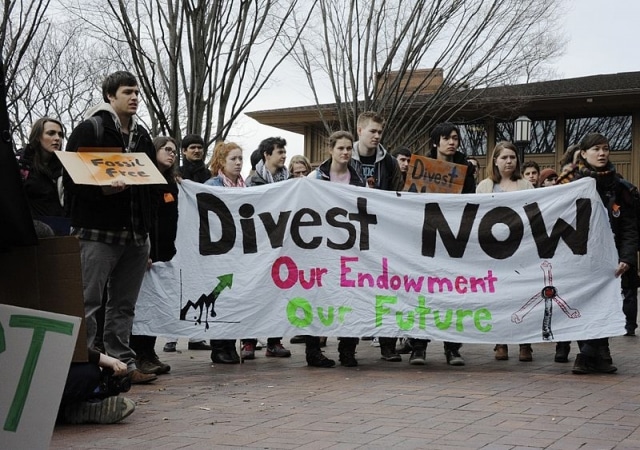As of September 2014, 181 institutions and local governments as well as 656 individual investors representing more than $50 billion in assets had pledged to join the growing fossil fuel divestment movement, which seeks to take investments away from the oil, gas and coal companies that are cooking our atmosphere and reinvest that money in the development of a low-carbon economy.
This has, understandably, caused quite a bit of alarm amongst the fossil fuel set.
Enter Daniel Fischel, chairman and president of economic consulting firm Compass Lexecon, who recently published an op-ed in the Wall Street Journal called “The Feel-Good Folly of Fossil-Fuel Divestment” in which he discussed the findings of a forthcoming report that “indicates that fossil-fuel divestment could significantly harm an investment portfolio.”
Fischel goes out of his way to appear to have the interests of the poor universities called on to divest at heart: “Every bit of economic and quantitative evidence available to us today shows that the only entities punished under a fossil-fuel divestment regime are the schools actually doing the divesting,” he concludes.
You had to get past the WSJ’s paywall and then read to the bottom of the piece before you got to the most salient point: “The report discussed in this op-ed, ‘Fossil Fuel Divestment: A Costly and Ineffective Investment Strategy,’ was financed by the Independent Petroleum Association of America.”
With the study funded by the Independent Petroleum Association of America, there should be no wonder why Fischel so confidently warned, “Students and universities may nevertheless wish to make a symbolic or political statement, but they should know it will come at a high price.”
The New York Times picked up the story, adding: “Professor Fischel said in an interview that the industry group and its financing did not influence the outcome.”
That’s right: A Big Oil front group paid for a study that just so happened to determine that divesting from holdings in fossil fuels is a really bad idea, and we’re to believe that the obvious bias of his client had no influence whatsoever on the way Fischel conducted his research or reached his conclusions.
If you have any doubt that IPAA had an agenda in commissioning this report, look no further than the fact that it has already launched a Twitter account, @DivestmentFacts, that purports to be “An educational project of @IPAAaccess – focused on injecting facts, data, real-world perspective into the ongoing debate over divestment.” The IPAA has also created a website for its Divestment Facts campaign built entirely around the Compass Lexecon report and has reportedly organized press interviews for Fischel.
This would not be the first time the IPAA spearheaded an oil industry-backed “educational” effort in the face of criticism. DeSmog previously uncovered IPAA‘s role in creating Energy In Depth, a “major initiative to respond to…attacks.” (A recent report exposed Energy In Depth for relying on “retracted and discredited” studies in its defense of the shale oil and gas industries.)
But let’s look at the actual claims Fischel makes, which he says are supported by his team’s research. If you stack the claims of the Compass Lexecon report against the findings of previous studies, it’s clear Fischel’s claims just don’t add up.
The Compass Lexecon report found that funds without energy stocks underperformed those with energy stocks by as much as 0.7%, which Fischel and team say could cost university endowments as much as $3 billion a year.
These findings are starkly at odds with previous studies that found fossil fuel divestment would have little to no impact on returns. Northstar Asset Management predicted a penalty of just 0.15% in a study entitled “To Paraphrase Mark Twain: The Cost of Fossil Fuel Divestment Has Been Greatly Exaggerated.” And financial advisors at the Aperio Group found that excluding the “Filthy Fifteen” — the worst of the worst in coal-fired energy and mining companies — incurred “virtually no risk penalty.”
Schools that are currently resisting the demands of campus divestment movements are no doubt going to use Fischel’s study to bolster their position. But according to the Associated Press, they would be shooting themselves in the foot: “While many schools argue divestment would harm their endowments, an analysis conducted for The Associated Press casts doubt on that. The research firm S&P Capital IQ found that by one measure, endowments would have been better off had they divested 10 years ago.”
Jamie Henn of 350.org points out another problem with the Compass Lexecon study, namely that it cherry-picks which data to consider. Oil industry stocks have performed okay over the last 50 years, but they’ve underperformed in the last 5-10 years. “Past performance isn’t an indicator of future returns,” Henn writes. “The next 50 [years] of the oil industry will be vastly different than the last 50.”
Here is, perhaps, a portent of exactly what’s in store for oil stocks over the next 50 years, as the nations of the world get serious about combating climate change and moving away from dirty energy. And it’s from an energy policy reporter for, fittingly enough, the Wall Street Journal:
Shares of major independent oil companies plunge 85%, 42%, 33% & 26% http://t.co/K76sSdhVyD by @ailworth & @LynnJCook pic.twitter.com/Zf9WHshHMO
— Amy Harder (@AmyAHarder) February 10, 2015
Image Credit: James Ennis / Wikimedia Commons
Subscribe to our newsletter
Stay up to date with DeSmog news and alerts







